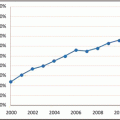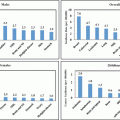Fig. 13.1
The most common types of cancer among Sudanese patients, 2009–2010. National cancer strategy, Sudan 2012–2016
Early Detection in Sudan
There are some efforts to train primary healthcare workers in cancer awareness and suspicion, but these have not been scaled up or systematized. Early detection guidelines have been developed for breast, oral, and cervical cancer [12]. There are no organized screening programs other than sporadic efforts in the private and NGO sectors. Some states as Gezira and River Nile practiced a small scale or pilot screening for breast cancer. At North Kordofan there was a demonstration project for use of Visual Inspection with Acetic acid (VIA) test in cervical cancer. The shortcomings in cancer diagnosis and early detection, and health education are demonstrated by the late presentation of cancer.
In addition to centralization of the health services, the majority of cancer services based in Khartoum and neighboring states (Medani-Gezira state & Shendi—River Nile state). Tobacco control measures need urgent attention for high incidences of oral and lung cancer.
While much is being done for the treatment of cancer, less attention has been paid to important components: prevention and early detection. At the time of RICK’s inception in 1967, an estimated 85–90 % of cancer cases presented late. This trend has not changed noticeably in the 45 years since its opening. The National Health Insurance offers access to mammography and blood exams at basic centers, sometimes of poor quality. The MoH is educating newly appointed medical officers on cancer early detection, signs and symptoms, screening and referral, but lack of facilities at primary health centers impedes the work. Several civil society associations are highly involved in education and screening about breast and oral cancers. More work is still needed to be done.
Treatment
A challenge facing proper diagnosis is the lack of reagents (or availability of reagents of poor quality) in the pathology laboratories which result in ineffective diagnosis and later improper treatment of cancer. There is scarcity of pathologists. Proper pathological diagnosis is possible in only two cities: Khartoum and Madani. The MoH is availing the chemotherapy drugs for free benefiting even foreigners residing or passing by the country. Lack of planning and proper management of resources (e.g., opting for brand names) leads to some shortages in basic chemotherapeutic agents for periods that might reach 2 months. Apart from drug availability, a lot needs to be done in organization, training, and provision of service in order to improve patients’ care.
There is a local training for clinical oncologists that started in the late 1990s. It helped a lot in providing trained staff committed to work in the country. Before that training cancer centers witnessed huge loss of staff qualified abroad.
Stay updated, free articles. Join our Telegram channel

Full access? Get Clinical Tree





